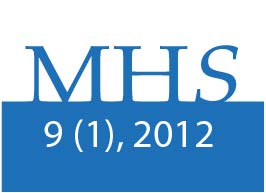The influence of a physical activity program on the body and the cardio vascular parameters of premenopausal women
DOI:
https://doi.org/10.15359/mhs.9-1.1Keywords:
Fat mass, blood pressure, aerobics, body mass index, weightAbstract
During the life cycle of a woman's body figure is changed gradually, but on reaching middle age, as a result of follicular loss of ovarian function among others, are emphasized the physiological changes and increase health risk and welfare. Androgyny in association with obesity increases the risk for diabetes, hypertension, dyslipidemia, atherosclerosis, cardiovascular disease, gallstones, osteoarthritis, arthritis, cancers and other disorders of female middle age. Physical activity has gained importance increasing in therapy in the climacteric. It has demonstrated the positive effects of exercise on cardiovascular disease and weight maintenance. This study investigates the influence of a physical activity program for five months on cardiovascular risk factors like high blood pressure and body composition in premenopausal women. The study included 20 premenopausal women, separated into two groups: younger than 35 years (n = 10), and over 35 years (n = 10). The experimental subjects underwent an assessment of blood pressure and body composition before and after an aerobic training. Results indicate greater extent in reducing diastolic blood pressure and body fat in over 35 years premenopausal women. Therefore, performing aerobics, step and toning improves factors cardiovascular risk as high blood pressure and body composition in over 35 premenopausal women.
References
Afghani, A., Abbott, A. V., Wiswell, R. A., Jaque, S. V., Gleckner, C., Schroeder, E. T., y col., (2004). Central adiposity, aerobic fitness, and blood pressure in premenopausal Hispanic women. International Journal of Sports Medicine, 25(8), 599-606. https://doi.org/10.1055/s-2004-820947
Anthony, D., Baggott, R., Tanner, J., Jones, K., Evans, H., Perkins, G., y cols. (2012). Health, lifestyle, belief and knowledge differences between two ethnic groups with specific reference to tobacco, diet and physical activity. Journal of Advanced Nursing. https://doi.org/10.1111/j.1365-2648.2012.05948.x
Arsenault, B. J., Rana, J. S., Lemieux, I., Despres, J. P., Kastelein, J. J., Boekholdt, S. M., & cols. (2009). Physical inactivity, abdominal obesity and risk of coronary heart disease in apparently healthy men and women. International Journal of Obesity (London), 34(2), 340-347. https://doi.org/10.1038/ijo.2009.229
Cowley, A. W., Jr., Dzau, V., Buttrick, P., Cooke, J., Devereux, R. B., Grines, C. L., & col., (1992). Working group on noncoronary cardiovascular disease and exercise in women. Medicine & Science in Sports & Exercise, 24(6 Suppl), S277-287. https://doi.org/10.1249/00005768-199206001-00010
Dansou, P., Kotin, M. L., Laleye, A., Lawani, M., & Darboux, R. (2004). Effects of physical activity on adipose tissue cellularity in premenopausal obese women in Benin. Sante, 14(3), 183-186.
Díaz Sánchez M. E. (1999). Trabajo de Revisión: Biotipo y climaterio femenino.
Revista Cubana de Medicina General Integral, 15(3).
Despres, J. P., Pouliot, M. C., Moorjani, S., Nadeau, A., Tremblay, A., Lupien, P. J., & col., (1991). Loss of abdominal fat and metabolic response to exercise training in obese women. American Journal of Physiology, 261(2 Pt 1), E159-167.
Fritz, P. (2009). [Health development program package and its effectiveness on the students in high schools and universities.]. Orv Hetil, 150(27), 1281-1288. https://doi.org/10.1556/OH.2009.28656
Fuster, V., Rebato, E., Rosique, J., & Fernandez Lopez, J. R. (2008). Physical activity related to forced vital capacity and strength performance in a sample of young males and females. Collegium Antropologicum, 32(1), 53-60.
Goberna, J. (2002). Promoción de la salud en el climaterio. Matronas Profesión, 8, 4-12.
Godfrey, J. R., & Nelson, M. E. (2009). Toward optimal health: promoting physical activity in women. Journal of Women’s Health (Larchmt), 18(3), 295-298. https://doi.org/10.1089/jwh.2008.1331
Gregory, C. O., Martorell, R., Narayan, K. M., Ramirez-Zea, M., & Stein, A. D. (2009). Five-year changes in adiposity and cardio-metabolic risk factors among Guatemalan young adults. Public Health Nutrition, 12(2), 228-235. https://doi.org/10.1017/S1368980008003443
Harris, K. C., Kuramoto, L. K., Schulzer, M., & Retallack, J. E. (2009). Effect of school-based physical activity interventions on body mass index in children: a meta-analysis. Canadian Medical Association Journal, 180(7), 719-726. https://doi.org/10.1503/cmaj.080966
Hauner, H. (1995). Nutrition and metabolic syndrome. Internist (Berl), 36(11), 1040-1045.
Henry-Okafor, Q., Cowan, P. A., Wicks, M. N., Rice, M., Husch, D. S., & Khoo, M. S. (2011). Effect of obesity on cardiovascular disease risk factors in african american women. Biological Research For Nursing, 14(2), 171-179. https://doi.org/10.1177/1099800411405031
Hjern, F., Wolk, A., & Hakansson, N. (2011). Obesity, physical inactivity, and colonic diverticular disease requiring hospitalization in women: a prospective cohort study. The American Journal of Gastroenterology, 107(2), 296-302. https://doi.org/10.1038/ajg.2011.352
Isler, A. K. (2006). Lipid and lipoprotein changes in premenstrual women following step aerobic dance training. International Journal of Sports Medicine, 27(4), 343. https://doi.org/10.1055/s-2006-924009
Ito, H., Ohshima, A., Tsuzuki, M., Ohto, N., Yanagawa, M., Maruyama, T., y col., (2001). Effects of increased physical activity and mild calorie restriction on heart rate variability in obese women. Japanese Heart Journal, 42(4), 459-469. https://doi.org/10.1536/jhj.42.459
Kalman, D., Colker, C. M., Wilets, I., Roufs, J. B., & Antonio, J. (1999). The effects of pyruvate supplementation on body composition in overweight individuals. Nutrition, 15(5), 337-340. https://doi.org/10.1016/S0899-9007(99)00034-9
Kang, H. S., Matsuo, T., & Suzuki, M. (2004). Effects of light resistance exercise using dumbbells and rubber band with mild energy restriction on body composition and physical fitness in obese Korean women. Asia Pacific Journal of Clinical Nutrition, 13(3), 242-247.
Kavanagh, T., Myers, M. G., Baigrie, R. S., Mertens, D. J., Sawyer, P., & Shephard, R. J. (1996). Quality of life and cardiorespiratory function in chronic heart failure: effects of 12 months' aerobic training. Heart, 76(1), 42-49. https://doi.org/10.1136/hrt.76.1.42
Kaye, S. A., Folsom, A. R., Prineas, R. J., Potter, J. D., & Gapstur, S. M. (1990). The association of body fat distribution with lifestyle and reproductive factors in a population study of postmenopausal women. International Journal of Obesity, 14(7), 583-591.
Kin Isler, A., Kosar, S. N., & Korkusuz, F. (2001). Effects of step aerobics and aerobic dancing on serum lipids and lipoproteins. Journal of Sports Medicine and Physical Fitness, 41(3), 380-385.
Kizer, J. R., Biggs, M. L., Ix, J. H., Mukamal, K. J., Zieman, S. J., de Boer, I. H., & cols. (2010). Measures of adiposity and future risk of ischemic stroke and coronary heart disease in older men and women. American Journal of Epidemiology, 173(1), 10-25. https://doi.org/10.1093/aje/kwq311
Ko, G. T., Tsang, P. C., & Chan, H. C. (2006). A 10-week Tai-Chi program improved the blood pressure, lipid profile and SF-36 scores in Hong Kong Chinese women. Medical Science Monitor, 12(5), CR196-199.
Krustrup, P., Hansen, P. R., Randers, M. B., Nybo, L., Martone, D., Andersen, L. J., & col. (2010). Beneficial effects of recreational football on the cardiovascular risk profile in untrained premenopausal women. Scandinavian Journal of Medicicine & Science in Sports, 20, Suppl 1, 40-49. https://doi.org/10.1111/j.1600-0838.2010.01110.x
Leyk, D., Ruther, T., Wunderlich, M., Heiss, A., Kuchmeister, G., Piekarski, C., & col., (2008). Sporting Activity, Prevalence of Overweight, and Risk Factors: Cross-Sectional Study of More Than 12 500 Participants Aged 16 to 25 Years. Deutsches Arzteblatt International, 105(46), 793-800.
Mensink, G. B., Heerstrass, D. W., Neppelenbroek, S. E., Schuit, A. J., & Bellach, B. M. (1997). Intensity, duration, and frequency of physical activity and coronary risk factors. Medicine and Science in Sports and Exercise, 29(9), 1192-1198. https://doi.org/10.1097/00005768-199709000-00012
Montalcini, T., Gorgone, G., Garzaniti, A., Gazzaruso, C., & Pujia, A. (2010). Artery remodeling and abdominal adiposity in nonobese postmenopausal women. European Journal of Clinical Nutrition, 64(9), 1022-1024. https://doi.org/10.1038/ejcn.2010.131
Mosher, P. E., Ferguson, M. A., & Arnold, R. O. (2005). Lipid and lipoprotein changes in premenstrual women following step aerobic dance training. International Journal of Sports Medicine, 26(8), 669-674. https://doi.org/10.1055/s-2004-830437
Oguma, Y., Sesso, H. D., Paffenbarger, R. S., Jr., & Lee, I. M. (2002). Physical activity and all cause mortality in women: a review of the evidence. British Journal of Sports Medicine, 36(3), 162-172. https://doi.org/10.1136/bjsm.36.3.162
Owens, J. F., Matthews, K. A., Wing, R. R., & Kuller, L. H. (1990). Physical activity and cardiovascular risk: a cross-sectional study of middle-aged premenopausal women. Preventive Medicine, 19(2), 147-157. https://doi.org/10.1016/0091-7435(90)90016-D
Palatini, P., Visentin, P., Dorigatti, F., Guarnieri, C., Santonastaso, M., Cozzio, S., & col., (2009). Regular physical activity prevents development of left ventricular hypertrophy in hypertension. European Heart Journal, 30(2), 225-232. https://doi.org/10.1093/eurheartj/ehn533
Rana, J. S., Li, T. Y., Manson, J. E., & Hu, F. B. (2007). Adiposity compared with physical inactivity and risk of type 2 diabetes in women. Diabetes Care, 30(1), 53-58. https://doi.org/10.2337/dc06-1456
Saavedra, J. M., De La Cruz, E., Escalante, Y., & Rodriguez, F. A. (2007). Influence of a medium-impact aquaerobic program on health-related quality of life and fitness level in healthy adult females. Journal of Sports Medicine and Physical Fitness, 47(4), 468-474.
Schmitz, K. H., Hannan, P. J., Stovitz, S. D., Bryan, C. J., Warren, M., & Jensen, M. D. (2007). Strength training and adiposity in premenopausal women: strong, healthy, and empowered study. American Journal of Clinical Nutrition, 86(3), 566-572.
Tucker, L. A., & Bates, L. (2009). Restrained eating and risk of gaining weight and body fat in middle-aged women: a 3-year prospective study. American Journal of Health Promotion, 23(3), 187-194. https://doi.org/10.4278/ajhp.07061456
Tucker, L. A., & Thomas, K. S. (2009). Increasing total fiber intake reduces risk of weight and fat gains in women. Journal of Nutrition, 139(3), 576-581. https://doi.org/10.3945/jn.108.096685
Van Roie, E., Delecluse, C., Opdenacker, J., De Bock, K., Kennis, E., & Boen, F. (2010). Effectiveness of a lifestyle physical activity versus a structured exercise intervention in older adults. Journal of Aging and Physical Activity, 18(3), 335-352. https://doi.org/10.1123/japa.18.3.335
Wang, C. Y., Yeh, C. J., Wang, C. W., Wang, C. F., & Lin, Y. L. (2010). The health benefits following regular ongoing exercise lifestyle in independent community-dwelling older Taiwanese adults. Australasian Journal on Ageing, 30(1), 22-26. https://doi.org/10.1111/j.1741-6612.2010.00441.x
Downloads
Published
How to Cite
Issue
Section
License
General conditions
MHSalud: Journal in Human Movement Sciences and Health by the Universidad Nacional is cover under a Creative Commons Atribución-NoComercial-SinDerivadas 3.0 Costa Rica license.
The journal is hosted in open access repositories such as the Institutional Repository of the Universidad Nacional, the Kimuk Repository of Costa Rica and La Referencia.
The editorial source of the journal must be recognized. Use the doi identifier for this purpose.
Self-archiving policy: The journal allows the self-archiving of the articles in their peer-reviewed version, edited and approved by the Editorial Board of the Journal to be available in Open Access through the Internet. More information in the following link: https://v2.sherpa.ac.uk/id/publication/25815



















